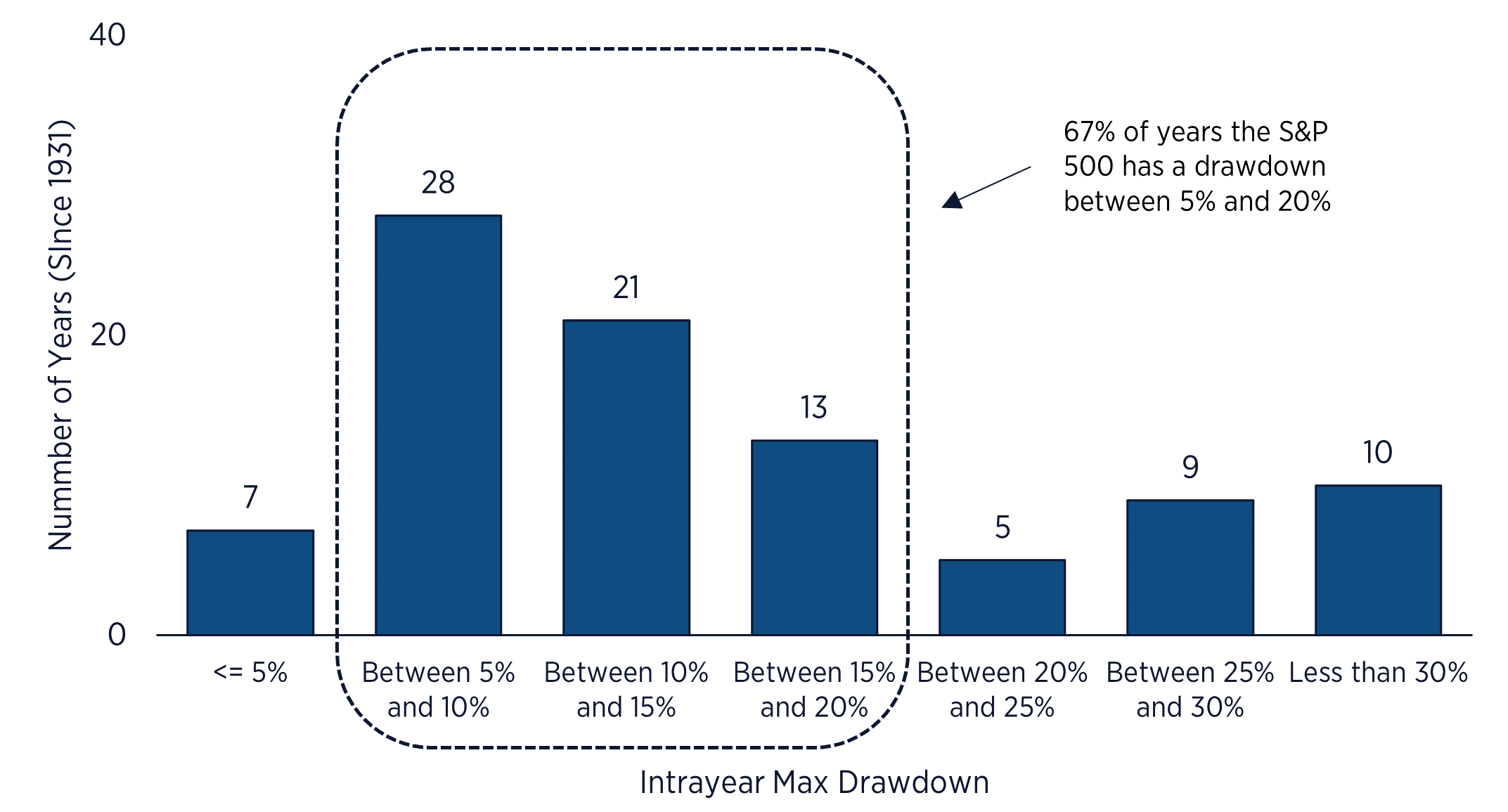After relative calm in the stock market last year, volatility has returned in 2022. At the close of business on January 27th, the S&P 500 Index was down 9.7 percent from its all-time high reached on January 4th, narrowly avoiding an official correction. Earlier in the week, the index was actually down 11.9 percent from its high during the trading day before rallying toward the end of the day. Even with the market’s 2.5 percent rally this past Friday the S&P 500 Index is still 7.2 percent below its highest level.
It is not surprising that stock prices have been volatile this year. At the beginning of the year, we noted in the HBKS Wealth Advisors Market and Economic Outlook that the stock market was ripe for an increase in volatility. Stocks were expensive according to most measures, especially the handful of stocks that have been driving the stock indices higher. Thin stock market leadership and high valuations, combined with rising interest rates and a slowing economic recovery meant the risks in owning stocks were higher than at any time during the economic recovery. This type of environment does not necessarily mean stock prices will drop substantially, but it does mean that the risk in owning stocks is high and all it takes is some sort of catalyst to cause more volatility in stock prices.
That catalyst was provided by the US Federal Reserve. Investors were already on edge because the US Central Bank has been reducing the stimulus it has been providing the economy and indicated it would soon begin raising the discount rate to head off inflation. Then Fed Chairman Powell, in his press conference on January 26, struck a more hawkish tone than most investors expected. He indicated that the Fed will begin raising the discount rate in March and will more aggressively raise rates and curtail bond purchases the rest of the year. This caught the market off guard and led to further profit-taking in stocks.
Amid falling stock prices, it is important to remember that the level of volatility we have experienced this year is not abnormal. Unpredictability and rapidly changing prices are a very normal part of investing in the stock market. Capital IQ performed the study summarized below and found that the S&P 500 Index has experienced a drawdown between 5 percent and 20 percent in two-thirds of the calendar years since 1931. Further, the S&P 500 Index has experienced a drawdown of 10 percent or more about two-thirds of the time.
 Source: Capital IQ
Source: Capital IQ
Long-term investors would be wise to remain focused on their long-term objectives and remain invested in the investments that have sold off through the downturn. Long-term investing requires patience. It is never wise to try and time an exit and reentry into stocks around the market’s movements. For an investor to come out ahead they must make two correct decisions: when to get out of a stock position, and when to reinvest. Historically, studies show that predicting when the market will turn around is nearly impossible. Also, many large moves higher can occur during bouts of volatility, and an investor who is trying to time the market will miss those days.
Because timing the market is nearly impossible, smart investors keep their focus on the expected returns of their assets over a long-time horizon. During periods of stress, investors should maintain their current asset allocation and take advantage of the panic of other investors by rebalancing their portfolio to their targeted allocation when a drop in prices has become excessive.
Falling stock prices may continue, but eventually, stock prices will rebound. It is very possible that the Fed may not be as aggressive as the market seems to think right now. By the middle of the year, the supply bottlenecks are likely to ease while interest rates are moving higher. The result could be slower growth and receding inflationary pressures in the second half of the year, which would remove the need for the Fed to continue aggressively tightening monetary policy.
An environment of slow but positive growth, along with interest rates and inflation leveling off at modestly higher levels could provide an environment for modest gains in stock prices. Investors who have a solid long-term plan should stay the course. They have probably had solid results, so they are still better off than they were a year or two ago. The worst thing they could do would be to make a bad decision trying to avoid a short-term loss.
IMPORTANT DISCLOSURES
The information included in this document is for general, informational purposes only. It does not contain any investment advice and does not address any individual facts and circumstances. As such, it cannot be relied on as providing any investment advice. If you would like investment advice regarding your specific facts and circumstances, please contact a qualified financial advisor.
Any investment involves some degree of risk, and different types of investments involve varying degrees of risk, including loss of principal. It should not be assumed that future performance of any specific investment, strategy or allocation (including those recommended by HBKS® Wealth Advisors) will be profitable or equal the corresponding indicated or intended results or performance level(s). Past performance of any security, indices, strategy or allocation may not be indicative of future results.
The historical and current information as to rules, laws, guidelines or benefits contained in this document is a summary of information obtained from or prepared by other sources. It has not been independently verified, but was obtained from sources believed to be reliable. HBKS® Wealth Advisors does not guarantee the accuracy of this information and does not assume liability for any errors in information obtained from or prepared by these other sources.
HBKS® Wealth Advisors is not a legal or accounting firm, and does not render legal, accounting or tax advice. You should contact an attorney or CPA if you wish to receive legal, accounting or tax advice.
